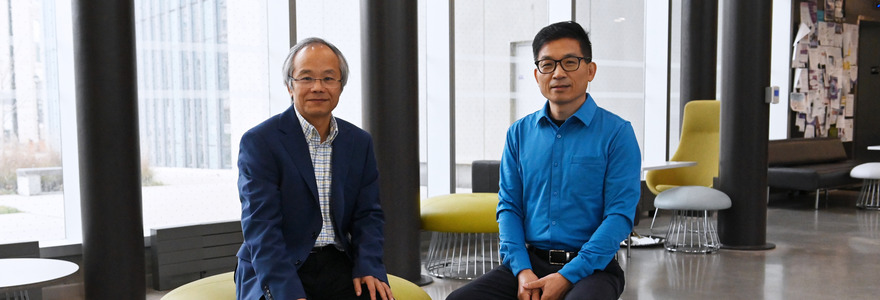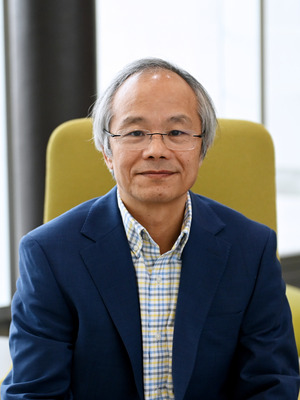Funding sets stage for major innovations in biotherapeutics and translational research

(Emily Leighton/Schulich Medicine & Dentistry Communications)
By Emily Leighton
A hockey player sustains a suspected concussion or brain injury on the ice. The player is given a simple blood test that determines the severity of their injury. Treatment is then delivered rink-side to remove or block the toxic neuroprotein detected by the test, ensuring no long-term effects occur.
This is precision medicine in action – and, with a major funding boost announced today, it’s precisely the kind of therapy that researchers at Schulich Medicine & Dentistry are striving toward.
“Our goal is to detect disease at an earlier stage and deliver personalized treatment,” said Dr. Kun Ping Lu, professor with the Departments of Biochemistry and Oncology and Western Research Chair in Biotherapeutics.
With more than $4.5 million in funding from the Canada Foundation for Innovation (CFI), Lu and Shawn Li, PhD, are leading the establishment of a centre for biotherapeutics research. The investment comes through CFI’s Innovation Fund, part of $14.7 million awarded to five projects at Western University.
Biotherapeutics harness the body’s natural ability to fight disease. From tailored cancer therapies designed to disarm the most aggressive tumours to genetic therapies that correct inherited disorders like cystic fibrosis, biotherapies are revolutionizing how we diagnose, prevent and treat disease.
 Dr. Kun Ping Lu
Dr. Kun Ping Lu
Unlike their traditional counterparts – chemically synthesized small-molecule drugs – biotherapeutics are typically large, complex molecules produced using biotechnology techniques, such as genetic engineering or mammalian cell culture.
Perhaps the most famous example is insulin, a hormone made by the pancreas – the discovery of which has strong ties to Western University and London, Ontario. And more recently, COVID-19 mRNA vaccines were developed in response to the global pandemic, using specific viral proteins that elicit an immune response.
“Biotherapeutics are transforming medicine to address some of the most pressing health challenges of our time,” said Lu. “Investing in a centre for biotherapeutics research at Western will enable us to be a major contributor to this revolution.”
The biotherapeutics centre will bolster researchers’ current efforts to identify, optimize and produce biotherapeutics, from discovery to clinical trials and beyond, with a major focus on age-related diseases, such as cancer, neurodegeneration and sepsis infection.
“There is already a very strong biotherapeutic presence at Western,” said Li, professor with the Department of Biochemistry and Canada Research Chair in Molecular and Epigenetic Basis of Cancer.
Researchers at Schulich Medicine & Dentistry are leading discoveries in theranostics to diagnose and treat cancer and cardiovascular disease. The School is expanding its state-of-the-art Imaging Pathogens for Knowledge Translation (ImPaKT) Facility and making progress on the planned Bioconvergence Centre, a hub for collaborative scientific discovery and education. And the newly announced Canada Excellence Research Chair Dr. Robyn Klein is bringing her pioneering research program in neuroimmunology to Western.
 Shawn Li, PhD
Shawn Li, PhD
The biotherapeutics centre will build on this exciting momentum. “The centre will continue to make translational research a key focus, encouraging collaboration between basic scientists and clinicians,” said Li.
As a principal investigator on the project, Lu’s own research program targets the toxic cis P-Tau protein linked to Alzheimer’s disease, traumatic brain injury (TBI), stroke and preeclampsia – a 2023 study with collaborators at Brown University showed the protein plays a major role in causing the pregnancy complication.
An antibody developed by Lu’s research partner, Dr. Xiao Zhen Zhou, to target only the toxic protein while leaving its healthy counterpart unscathed is currently undergoing clinical trials in patients suffering from TBI and Alzheimer’s.
“This is the strong foundation we’re building on,” said Li. “We’ll be developing first-in-class biotherapeutics, and our goal is to build the premier centre for biotherapeutics in Canada and the world.”
Supporting researchers in better understanding brain function
Lisa Saksida, PhD, Ravi Menon, PhD, and a team of researchers also received $3 million in CFI funding for the Mouse Translational Research Accelerator Platform (MouseTRAP).
MouseTRAP supports researchers in better understanding brain function in health and disease, as well as advances in diagnosis and treatment for neurodegenerative and neuropsychiatric disorders.
The Platform tests cognition in the same way for animals and humans, giving a much better indication of how new therapies will likely impact human cognition. Using iPad touchscreens with prompts and rewards, the research team can map complex cognitive processes like decision-making, attention and planning across species to help them assess drugs in ways that have never been attempted before.
“This combination of technologies and interdisciplinary expertise is not available anywhere else in the world,” said Saksida. “The CFI funding will enable MouseTRAP to do more, faster, and to progress toward effective treatments for diseases of cognition, including Alzheimer’s and Parkinson’s.”
MouseTRAP operates within Western University and is available to researchers on a fee-for-service basis. The research team includes Tim Bussey, PhD, Marco Prado, PhD, Vania Prado, PhD and Taylor Schmitz, PhD.








